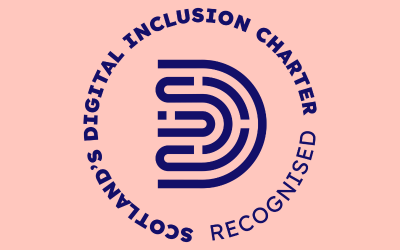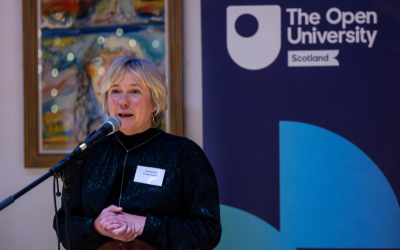You are here
- Home
- OU research reveals shocking level of online violence experienced by women and girls across Scotland
OU research reveals shocking level of online violence experienced by women and girls across Scotland

- More than one in six women (17%) have experienced online violence, while over a third of women (35%) have witnessed online violence.
- Seven in 10 (71%) believe that current legislation is ineffective at tackling online violence against women and girls.
- One in nine (11%) of women who experienced online violence say this progressed to offline violence.
- The Open University surveyed 2000 adults across Scotland as part of the largest-ever national study into online violence against women and girls.
Researchers from The Open University have carried out the UK’s largest ever study into societal attitudes and experiences of online violence against women and girls across England, Scotland, Wales and Northern Ireland.
The findings reveal that in Scotland, one in six women have experienced online violence, with this figure increasing amongst those aged 16-24 (27%) and LGB+ women (45%).
When comparing responses across the nations, the research showed that women and girls in Scotland were the most likely to have witnessed online violence (35%), in comparison to those in Wales (27%), Northern Ireland (27%) and England (30%). Of even greater concern, one in nine Scots (11%) who have experienced online violence said it later progressed to offline violence.
"One in nine Scots who have experienced online violence said it later progressed to offline violence."
Online anonymity (54%), ease of getting away with it (47%) and misogyny (46%) top the most commonly perceived reasons for why people commit online violence against women and girls.
At the same time, a higher proportion of people in Scotland strongly support making online violence a criminal offence than England (73% of women and 55% of men in Scotland versus 69% of women and 50% of men in England). Interestingly, Scots overwhelmingly support new Scottish devolved laws designed to address online violence against women and girls (76% for men and 82% for women).
The findings illustrate some gender divides with men being more likely than women to believe that legally prohibiting online violence would limit their freedom of expression (17% of Scottish men and only 8% of women). Men were also more confident than women that the Scottish Government is doing all they reasonably can to address online violence (19% of men vs 14% of women).
The data showed a lack of confidence on the part of women and girls, that the authorities would deal effectively with a report of online violence. Almost one third of women in Scotland (32%) who experienced online violence were more likely to seek support from friends than the police (4%). And 64% of women stated that they thought the police lacked the resources needed tackle online violence against women and girls effectively. Over three quarters (76%) of women who reported online violence were not satisfied with the outcome.
Of those who have experienced online violence in Scotland, 85% said it had impacted on them, with six in ten (61%) reporting it had a negative impact on their mental health and wellbeing.
Susan Stewart, Director of The Open University in Scotland, said:
"We hope these findings will encourage policymakers and authorities to better tackle online violence." Susan Stewart,
Director of the OU in Scotland
“This new research represents the largest-ever study into societal attitudes and experiences of online violence against women and girls across the four nations. For Scotland, the results are extremely sobering and highlight how endemic online violence is in and what serious impacts it is having on girls’ and women’s lives and on our society as a whole.
“In line with The Open University’s mission to empower communities, tackle inequalities and drive positive societal change, we hope these findings will encourage policymakers and authorities to better tackle online violence.”
Professor Olga Jurasz, Senior Lecturer in Law at The Open University, who led the project, said:
“Online violence against women and girls can take many forms such as trolling, threats, abuse, unwanted sexual remarks, non-consensual sharing of intimate photos and messages, among many other examples and it disproportionately effects women. This can have a serious impact on women’s wellbeing and their behaviour, including a negative impact on mental and physical health, having to implement measures to protect themselves from abuse, and a change in willingness or ability to express views online.”
Catherine Murphy, Executive Director at Engender, Scotland’s feminist policy and advocacy organisation, commented on the research findings:
“Violence against women and girls is endemic in Scotland and has devastating physical and psychological consequences, disproportionately impacting women of colour, LGBTQ+ people, and other marginalised groups. The new research from The Open University further confirms this fact.
“Following six years of campaigning the UK Government’s Online Safety Bill will now include Women and Girls. The amendment will require Ofcom to publish guidance for tech companies on reducing the risk of harm to women and girls using their platforms. Engender is currently calling on the Scottish Government to also adopt a Digital Health and Safety at Work framework, supporting employers to ensure women’s right to workplace safety is upheld online.”
The first of its kind report surveyed 7500 adults (2000 in Scotland) over the age of 16, via YouGov, providing an insight into the thoughts and lived experiences of both men and women across the four nations.
The OVAWG research project forms part of the OU’s Open Societal Challenges Programme. The programme aims to tackle some of the most important societal challenges of our time through impact-driven research into pressing challenges facing people across the UK and worldwide to transform lives and drive societal change. The programme’s focus on the themes of tackling inequalities, living well and sustainability reflect the OU’s mission to be open to people, places, methods and ideas.
With backing from the OU’s Societal Challenge Programme, in 2022, Dr Kim Barker and Prof Olga Jurasz launched the Observatory on Online Violence Against Women (ObserVAW). The centre is Europe’s first to unite leading academics, non-governmental organisations (NGOs), policymakers, regulators, legal practitioners, educators and social media platforms to fight digital abuse.
7 September 2023
News
Media contacts
Media enquiries
OU in Scotland Media Relations:
Call 0131 549 7932
OU UK Press Office:
Call 01908 654316
Out-of-hours:
07901 515 891
Visit our OU UK news site

